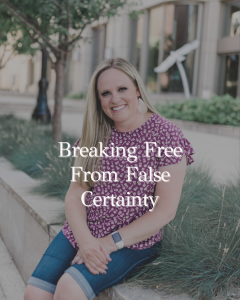
In this episode, we explore why sexual certainty, which is the belief that you already know exactly how intimacy should look, might actually be blocking passion and connection in your relationship. You’ll learn the difference between confidence and certainty, how curiosity creates space for growth, and why faith and openness are key to deeper intimacy. Through personal stories, brain science, and real-life coaching examples, you’ll see how letting go of rigid beliefs and asking better questions can transform your marriage, strengthen your connection, and help you discover new levels of joy in your intimate relationship.
Show Summary:
Today I want to talk about something that’s been on my heart lately, something that I think affects so many of us in our intimate relationships, especially those of us who come from faith backgrounds. We’re talking about sexual certainty – and why it might be the very thing that’s keeping you from the passionate, connected relationship you’re craving.
Now, I know that might sound backwards. In our culture, we’re taught that confidence is key, that knowing what you want and going after it is the path to success. And while that’s true in many areas of life, when it comes to sexuality and intimacy, certainty – which is different than confidence – can actually become our biggest roadblock.
Confidence says, “I believe in myself and my ability to navigate this.” Certainty says, “I know exactly how this should be and there’s no room for anything different.” You can be confident in your relationship and your worth while still remaining curious and open to growth.
Personal Story
Let me share something personal with you. For many years, I spent it in certainty about myself, my life, and even the church. I had it all figured out, or so I thought. I knew what my role was as a wife, I knew what was right and wrong, appropriate and inappropriate.
And what I’ve realized in recent years is that when there is certainty, there are no more questions. I had lost curiosity. And without questions, without curiosity, and with certainty, there was not a lot of growth.
I realized that, as long as I remained certain, I would get defensive when something or someone questioned me. Have you ever been there? Your spouse suggests trying something new, or expresses a desire that doesn’t fit your neat little box of what’s “normal,” and immediately you feel defensive? That was me.
But if I could stay curious and open and willing to see things from a different perspective, even if I didn’t agree, I felt stronger in my relationships and began an exponential growth process.
The Brain Science Behind Certainty
Here’s what’s fascinating from a neuroscience perspective: It’s interesting to me that my lower brain, the brain that was designed to keep me alive and safe, needs certainty. And without certainty, there’s anxiety, and with anxiety, we want to go back to more certainty to relieve it.
Think about it – when your spouse brings up something new they’d like to try in the bedroom, your lower brain immediately starts categorizing: Is this safe? Is this normal? Is this something “people like us” do? And if it doesn’t fit into your certain categories, anxiety kicks in.
But my higher self, my higher brain, my prefrontal cortex – the part of the brain that is able to move beyond the here and now and make choices with intentionality about what I want to create for myself – doesn’t need certainty. And the choice that I have to make is: do I want to rely on my lower brain and certainty and stay safe but not grow, or to have anxiety, to live in uncertainty, but have faith?
A Powerful Quote About Certainty
I recently watched a movie called “Conclave,” and there was a quote that absolutely stopped me in my tracks. The character says:
“My esteemed brothers, as we gather here in this solemn conclave, I urge you to consider the insidious nature of certainty. For within the hallowed halls of our faith, where the mysteries of God are paramount, certainty is not a virtue, but a perilous enemy to unity and tolerance. It is the serpent in the garden, whispering false promises of absolute knowledge, blinding us to the richness of diverse perspectives and the ever-present need for humility.”
And then: “Let us not be seduced by the illusion of certainty, but instead, let us embrace the richness of our faith through the lens of humility, recognizing that true leadership lies in the willingness to listen, to doubt, and to seek God’s will with an open heart.”
Now, this was about religious leadership, but I couldn’t help but think about how this applies to our intimate relationships. How often do we approach our sexuality with this “insidious certainty” that blinds us to new possibilities?
Sexual Certainty in Practice
Let me give you some examples of what sexual certainty looks like in real relationships:
The “Good Wife” Certainty: “I know exactly what my role is in our intimate relationship. I should be available but not too eager, responsive but not initiating, modest but passionate. I’ve got it figured out.”
The “This is How We Do Things” Certainty: “We’ve been married for 15 years, and we know what works. Why would we need to change anything? This is our pattern, our routine, our normal.”
The “That’s Not for Us” Certainty: “I know what’s appropriate for LDS couples and what isn’t. We don’t need to explore or experiment because I already know what’s right.”
The “I Know My Body” Certainty: “I know exactly what I like and what I don’t like. I’ve figured out my sexuality, and there’s nothing new to discover.”
Do any of these sound familiar? I see these patterns with my clients all the time, and honestly, I lived in several of these myself.
The Cost of Sexual Certainty
Here’s what happens when we operate from this place of certainty in our intimate relationships:
We stop asking questions. When was the last time you asked your spouse, “What would feel amazing to you right now?” or “Is there something you’ve been curious about that we haven’t talked about?” If you’re certain you already know, you stop asking.
We become defensive instead of curious. When our partner expresses a desire or suggests something new, instead of getting curious about their experience, we immediately judge it against our certain standards.
We miss opportunities for deeper connection. Some of the most beautiful intimate moments happen when we’re vulnerable enough to say, “I don’t know, but I’d love to explore this with you.”
We plateau in our growth. If you’re certain you’ve figured it all out, where’s the room for becoming even more connected, more passionate, more intimate?
The Humility Connection
When we have certainty, we do not have humility because we think we know it all. And we know that humility is so important – to see our weakness as human and part of our mortality and being humble and submitting to Christ that we don’t know. We don’t know at all. But he does, and so maybe the only certainty is that we need to have faith in him.
This hits me so deeply because in my LDS faith, we talk about how we’re here to learn and grow. If we approach our sexuality with certainty, we’re essentially saying, “I’ve learned all there is to learn in this area. No more growth needed here, thanks.”
But what if our intimate relationship is one of the most powerful classrooms for learning about vulnerability, communication, selflessness, and Christ-like love? What if certainty is actually keeping us from some of the most profound lessons of mortality?
Growth is the Point
Here’s something I’ve been thinking about a lot lately: we didn’t come to Earth to stay the same. We came here to grow, to stretch, to become more than we were yesterday. And growth, by definition, requires moving beyond what we currently know.
Think about it – every area of your life where you’ve experienced meaningful growth requires you to let go of some certainty. When you learned to be a parent, you had to let go of the certainty that you knew what was best for children. When you developed your testimony, you had to let go of the certainty that you had God all figured out. When you learned to truly love your spouse, you had to let go of the certainty that you knew everything about what love looked like.
Growth happens in the space between “I don’t know” and “now I understand a little more.” But when we operate from certainty, we eliminate that space entirely. We close ourselves off from the very experiences that could transform us.
In our intimate relationships, this is particularly tragic because these relationships have such incredible potential for growth. Your spouse is literally a different person than you – they have different experiences, different desires, different ways of feeling loved and connected. If you’re certain you already know everything about them or about what intimacy should look like, you’re missing out on a lifetime of discovery.
I think about couples who’ve been married for decades and are still learning new things about each other, still surprised by moments of connection they never expected. What’s the difference between those couples and the ones who feel like they’re just going through the motions? I believe it’s the willingness to stay uncertain, to stay curious, to keep growing together.
Real-Life Examples of Moving from Certainty to Curiosity
Let me share some examples from my coaching practice (with permission and details changed, of course):
Sarah’s Story: Sarah came to me absolutely certain that she wasn’t a “sexual person.” She’d been married for eight years and was convinced she just had a low sex drive. Period. End of story. But when we started exploring this certainty, we discovered she’d never actually asked herself what would feel good to her. She’d been so focused on being the “right” kind of wife that she’d never gotten curious about her own desires. When she shifted from “I know I’m not sexual” to “I wonder what I might enjoy,” everything changed. It took time, but she discovered parts of herself she never knew existed.
Mark and Lisa: This couple was certain they had a great sex life. They’d figured out their routine early in marriage and stuck with it for twelve years. But when Mark started expressing some desires for more variety, Lisa’s certainty kicked in: “We’re good. Why fix what isn’t broken?” It wasn’t until she could move from “I know what works” to “I wonder what could be even better” that they began to experience new levels of intimacy they never imagined.
Jennifer’s Journey: Jennifer was certain that certain activities were “not for LDS couples.” She had a very clear line in her mind about what was appropriate. But when her husband gently shared some of his desires, instead of immediately shutting them down with her certainty, she got curious. She studied, she prayed, she counseled with trusted mentors. She didn’t change all her boundaries, but she discovered that some of her certainties were based more on cultural assumptions than on actual doctrine or personal revelation.
The Power of “I Don’t Know”
One of the most powerful phrases you can introduce into your intimate relationship is “I don’t know.” Try these on:
- “I don’t know what I might enjoy if we explored this together.”
- “I don’t know why I’ve always thought that, let me get curious about it.”
- “I don’t know what this experience is like for you, will you help me understand?”
- “I don’t know if this is something I’d be into, but I’m willing to stay open.”
Notice how different these feel from:
- “I know I won’t like that.”
- “I know what’s right for us.”
- “I know that’s not something we should do.”
Practical Steps for Embracing Sexual Uncertainty
So how do we move from certainty to healthy curiosity in our intimate relationships? Here are some practical steps:
- Start with self-awareness. Notice when you feel defensive about something related to sexuality or intimacy. That defensiveness is usually a clue that you’re operating from certainty rather than curiosity.
- Practice the phrase “Help me understand.” When your spouse shares something that doesn’t fit your certain categories, instead of immediately judging or rejecting, try “Help me understand what that would be like for you.”
- Ask better questions. Instead of “Do you like this?” try “What does this feel like for you?” Instead of “Should we do this?” try “What draws you to this idea?”
- Create space for exploration. Set aside time to simply explore without any agenda or expectation. The goal isn’t to accomplish anything specific, but to stay curious about each other.
- Study together. Read books, take courses, listen to podcasts (like this one!) together. When you’re learning together, you’re naturally in a posture of “we don’t know everything yet.”
Addressing the Fear
Now, I know some of you are thinking, “But if I let go of my certainties, won’t that lead to chaos? Won’t I lose my moral compass?”
Here’s the beautiful thing: having boundaries and values is different from having rigid certainties. You can have strong convictions while still remaining curious. You can hold firm to your core beliefs while being open to new understanding.
In fact, I’d argue that when you’re operating from faith rather than certainty, your boundaries become even stronger because they’re based on personal revelation and deep conviction rather than just cultural assumptions or fear.
Faith vs. Certainty
Remember, faith and certainty are actually opposites. Faith requires not knowing for sure. Faith requires trust in something beyond our current understanding. When we operate from certainty in our intimate relationships, we’re actually operating from fear, not faith.
Faith says, “I don’t know exactly how this will go, but I trust that we can figure it out together.” Faith says, “I don’t have all the answers, but I believe God wants us to experience deep intimacy and joy.” Faith says, “I don’t know what I don’t know, but I’m excited to discover more about myself and my spouse.”
The Invitation
So here’s my invitation to you today: What if you let go of just one certainty about your sexuality or your intimate relationship? What if you got curious about one area where you’ve been absolutely sure you have it figured out?
Maybe it’s the certainty that you know everything about what your spouse enjoys. Get curious. Ask them something you’ve never asked before.
Maybe it’s the certainty that you’re “not the type of person” who would enjoy something. Get curious. What if you explored that assumption?
Maybe it’s the certainty that you’ve figured out your role in your intimate relationship. Get curious. What if there are other ways to love and serve your spouse that you haven’t discovered yet?
Closing Thoughts
I want to close with this thought: Our Heavenly Father is a God of infinite creativity and endless possibilities. If we approach our intimate relationships with the same curiosity and wonder that we’re supposed to approach our spiritual lives, imagine what we might discover.
The goal isn’t to become uncertain about everything. The goal is to remain humble enough to keep learning, growing, and becoming. In a world that often demands that we have all the answers, choosing curiosity over certainty in our intimate relationships is actually a radical act of faith.
Remember, you don’t have to have it all figured out. You don’t have to be the perfect sexual being. You just have to be willing to keep learning, keep growing, and keep trusting that there’s more beauty and connection available to you than you can currently imagine.
Remember, love is a journey, not a destination. Stay committed, stay passionate, and stay connected. I’ll see you next week…ba-bye.



